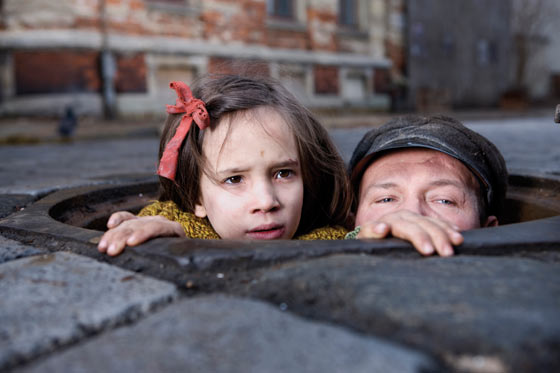
It’s far less fun, dramatically speaking, to watch people with firm moral convictions bravely act on them than to see scoundrels, bigots, and greedheads get moved to their core and impulsively cast aside self-interest. Ergo that reliably rousing subgenre, the “conversion melodrama.” Agnieszka Holland’s In Darkness is a familiar but stirring Oscar-season specimen (it’s a foreign-language-film nominee) centering on a spontaneously righteous Gentile, Leopold Socha (Robert Wieckiewicz), who becomes a guardian angel for a small group of Polish Jews after the Nazis and their Ukrainian henchman have “liquidated” their ghetto. A sewer worker and parasite, Socha does not choose heroism but has it thrust upon him after bumping into a band of Jewish men in the tunnels under Lvov, Poland (later Lviv, Ukraine). He and his young colleague Stefek (Krzysztof Skonieczny) agree to hide the men and some of their family members in the reeking, rat-infested sewers for a fee, although there is haggling over the price. “You’re bargaining over your own life just like any other Yid!” Socha fumes. It would be so much simpler—not to mention safer—to turn them in for a reward. The sewer already teems with bloated, bullet-ridden Jewish corpses.
I haven’t read the film’s main source, Robert Marshall’s In the Sewers of Lvov, but the memoir of Krystyna Chiger, The Girl in the Green Sweater (written with Daniel Paisner), makes clear that the real Socha never wavered in his commitment to “my Jews,” working to atone, he said, for a misspent youth. But screenwriter David F. Shamoon’s decision to tease you with the prospect of Socha giving up his charges (“They’re not even grateful,” he complains to his wife) makes good dramatic (if not ethical) sense, and Wieckiewicz is wonderful to watch. His doughy Socha strives to project peasant cunning, but his eyes keep stopping on the two small Jewish children—especially Krystyna (Milla Bankowicz), who reminds him of his own daughter. His survival instincts can’t keep pace with his humanity.
The script has its share of hackish melodrama (especially the subplot that features a Ukrainian jailmate of Socha’s who’s now a Nazi enforcer), but the pacing is classical, the compositions mysterious and painterly, the palette of deep blacks reminiscent of Rembrandt. Holland puts little weight on the familiar spiritual debates (“God isn’t listening!”) and much on the faces, so that even the stock juvenile lovebirds (Benno Furmann and Agnieszka Grochowska) have a haggard gravity. A scene in which naked women, their limbs a pale, bluish white, run through a forest pursued by Nazi gunmen is like something out of Goya’s Disasters of War—the mythic cruelty eats into your mind. But the purity of the victims isn’t overstated. “Where is our Polack Moses now?” demands one obnoxious would-be Jewish alpha male, recalling Moses’s own exasperated query to God: “What shall I do with these people?” In outline, In Darkness is a standard conversion melodrama, but little within those parameters is easy. The darkness lingers into the light.
Oren Moverman’s Rampart is a conversion melodrama manqué, which means the moral awakening comes too late to do anyone onscreen any good. The protagonist is a brazenly racist L.A. cop, David Brown (Woody Harrelson in Cro-Magnon mode), who once killed a serial date-rapist and now likens himself to a glorious soldier—the last of them in a world going p.c. and soft. To shake up a new female officer, he steers off the road toward a group of Latinos while reciting his standard operating procedure: “Aim for the shortest wetback, watch them skedaddle, plow the dices and the Schlitz-malt-liquor cans, and hit your siren in farewell.” Then he does just that. What he doesn’t count on is a video camera catching his next glorious act: the prolonged beating of a man who crashed into his cruiser and tried to flee.
The rest of Rampart (named for the L.A. community) is characters telling Brown at length what a horrible husband, father, cop, and human being he is and Brown telling them—in laughably hyperliterate language—why he’s a hero who only hurt bad people. All the while the camera is circling and moving in on good actors (Robin Wright, Audra McDonald, Anne Heche, Cynthia Nixon, Ben Foster, Sigourney Weaver, Ned Beatty) doing their semi-improvisational thing to try to look like nonactors. As Brown becomes more flagrantly self-destructive and at the same time more deluded, you realize you’re watching Bad Lieutenant made by a tediously finger-wagging Jew instead of a tediously desecrating Catholic.
See Also
Woody Harrelson on His Role in Rampart
In Darkness
Directed by Agnieszka Holland. R.
Rampart
Directed by Oren Moverman. R.
E-mail: filmcritic@newyorkmag.com.
